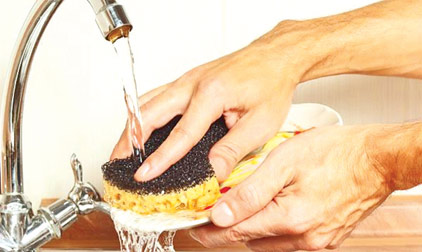|
 Benefits
of Mindfulness in Education - Part 3: Benefits
of Mindfulness in Education - Part 3:
Washing the Dishes
One important way to firmly establish Mindfulness is to extend it
beyond the formal practice sessions of Mindfulness of breathing. The
practitioners select a routine activity such as brushing their teeth or
washing the dishes and develop the ability to be fully awake from moment
to moment and live in that experience with full attention.
Benefits
Such development of Mindfulness in daily activities compliments the
formal sitting sessions and strengthens the overall results. In
addition, certain routine tasks conducted with Mindfulness helps to
dramatically improve the patience and emotional maturity of the
practitioners.
This second benefit needs to be further explained.
 We subconsciously and consciously broadly categorise activities of
our lives as what we 'like' and what we 'dislike'. We 'like' to listen
to our favourite song or eat our favourite Ice Cream. We 'dislike'
cleaning the toilet or washing the dishes. Our daily emotions swing
between these likes and dislikes most of the time like the pendulum of a
clock. We subconsciously and consciously broadly categorise activities of
our lives as what we 'like' and what we 'dislike'. We 'like' to listen
to our favourite song or eat our favourite Ice Cream. We 'dislike'
cleaning the toilet or washing the dishes. Our daily emotions swing
between these likes and dislikes most of the time like the pendulum of a
clock.
When we are faced with our daily chores such as washing the dishes or
the toilets, we do those at least with a little resentment as we don't
'like' to do those activities. Such resentment could result in mild
stress, animosity and even restlessness in daily living.
However, we cannot avoid and run away from the activities we dislike
all the time. Learning to cope Mindfully with the routine chores we
dislike will immensely help us to mature emotionally and also to reduce
some of the stress inducing factors of our lives.
In fact, a recent study at Florida State University found people who
washed the dishes while attending to awareness of their mind and body
experienced a 27% reduction in nervousness and a 25% increase in
feelings of inspiration!
There is a little known third benefit connected to developing
mindfulness in those daily activities we categorise as chores or
routine, dull day to day work. In situations involving such work we wish
to quickly finish those so that we will have more time for those
activities we 'like'. So people tend to rush through the work or 'switch
off' their mental and emotional faculties while doing such work. They
may think about other things, future and past events or of other people
and as a result be only partially awake at those times.
In time, as years go by, that partial wakefulness becomes a habit and
a state of mind we tend to use whenever we do boring routine activities.
When we are in that partially awake mindset, we may fail to notice
many things including various opportunities in life. Creativity and
ability to produce optimum results in any area of activity will develop
and nurture much better when we are fully awake.
Routine
This third benefit will be especially invaluable to school children.
Let's understand the methodology of developing Mindfulness on a
routine task such a washing the dishes by school children.
'The Mindfulness teacher asks and guides the students to wash the
dishes at their home as an important part of developing overall
Mindfulness in life.
1. He first explains that as washing the dishes involves repetitive,
slow physical movements it is an ideal activity to develop Mindfulness.
2. The students are asked to be aware of the stains of food on the
dishes. What colours and shapes do they see? How do they feel when
looking at the dirty dishes?
3. They are gently guided to be fully aware of the feelings without
reacting - as if they are observing another person.
4. They are asked to just observe the thoughts running through their
mind; "When I finish this, then I can relax" or even "This is stupid".
To be aware non-judgmentally, without getting carried away by those
thoughts.
5.
They are asked to begin the cleaning slowly, feeling the sensation of
water touching the skin and their hands gently rubbing and scrubbing the
plate, applying minimum pressure. They are asked to observe how the
bubbles form due to soap and water, sometimes sparkling as a result of
light reflecting. They will feel the smell of the soap and how the smell
of the plates change with washing.
6. The students are asked to wash each dish as if they are doing that
activity for the first time in their life with full of attention and
freshness.
7. Most importantly they are advised to let go of the urge to quickly
finish doing the washing. Just to settle down into the moment of Washing
the Dishes. To be fully alive in that moment.
This important exercise in Mindfulness is called 'Washing the dishes
to wash the dishes'. Schoolchildren gradually learn to become fully
awake in the present moment.
Aruna Manathunge can be contacted at
[email protected] |

